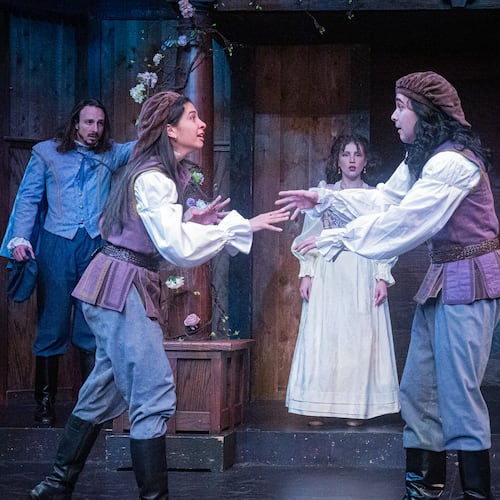Like “civil war” and “sweet sorrow,” “historical novel” is an oxymoron. “Historical” describes matters old and factual, but “novel” means new and fictional.
No wonder the genre can be so slippery — for readers and writers alike. Too much of the past makes for a rote, lifeless read. But too much new and the story becomes fantasy.
Atlanta author Daren Wang succeeds at revealing startling new insights in an otherwise well-chronicled era with his debut, “The Hidden Light of Northern Fires.”
The solemn and provocative historical novel attempts to answer a question that has vexed the author since childhood: Why did his hometown of Town Line, New York, vote in 1861 to secede from the United States?
Wang, the founding executive director of the AJC Decatur Book Festival, grew up in a farmhouse once inhabited by Mary Willis, an abolitionist who helped smuggle escaped slaves to the nearby Canadian border. “Hidden Light” creates a compelling backstory for Mary and her aggrieved neighbors, demonstrating that the Mason-Dixon Line was only the most obvious of many cracks in the Union.
A bare-bones plot synopsis might sound similar to another Civil War romance penned in Atlanta, the one featuring a headstrong young heroine, sibling rivalries and a senile patriarch. Like Scarlett O’Hara, Mary Willis struggles to keep the family farm afloat during the war and endures townsfolk’s judgments that she is “some kind of dangerous, lunatic shrew.” There’s even a sawmill and a star-crossed love affair.
But Mary proves to be a far less selfish and more activist-minded character. After graduating college, a rarity for women of the era, she returns to Town Line determined to join the abolitionist cause. The Willis homestead soon becomes the second-to-last stop on the Underground Railroad to safety.
Joe Bell collapses one night in Mary’s barn after fleeing a plantation in Virginia. He’s badly wounded from a dog attack and unable to continue the journey, putting the household in jeopardy of being discovered by bounty hunters. The town is crawling with Copperheads, Northerners eager to turn in escaped slaves for the reward money. Locals are none too sympathetic to “Lincoln the tyrant” or his cause.
As the situation heats up, “Hidden Light” burns through any parallels to “Gone With the Wind” and emerges as a different sort of book altogether, due partly to its structure and sprawling cast. The focus jumps between chapters devoted to Joe, Mary and a mixed bag of other characters, some more interesting than others. The most fascinating may be Leander, Mary’s rebellious younger brother, who wants nothing to do with the family business. He’d rather play baseball or hide out in his shanty in the woods. His sense of restlessness and longing to escape turn out to be a major theme of the novel and an impulse shared by essentially all the major players.
Bored and lonely in a town full of “nothing but cows, barley and slush,” Mary dreams of escaping to Manhattan, or riding west into the territories. Her old professor reminds her that even at university she would often stare off into the distance, longing to be someplace else. She confesses, “Even now I hear the train roll through our rye field each night and imagine the places the people are all going. They all pass me by and I just stay with everyone old and tired, or too cowardly to do anything that makes a difference.”
The memory foreshadows an unforgettable episode in which Mary and Joe venture into the fields late at night to watch Lincoln’s train roll past. The scene gives the author a chance to put his talent for evocative, lyrical language on full display: “The engine passed, heat, steam, snow and soot blowing in their faces, the engineer waving from his perch high above them. … The light from the swaying lamps shone on his face for an instant, flashing on those deep-set eyes. He had been standing in the moving car, staring into the dark and breaking country.”
Lincoln’s cameo here is fitting, but elsewhere the novel gets a little giddy with namedropping the likes of Harriet Beecher Stowe, Frederick Douglass, Susan B. Anthony and other luminaries of the era. Henry David Thoreau becomes a main topic of conversation between Mary and Joe after she lends him a copy of “Walden.” Joe imagines building a similar cabin for himself and Alaura, the younger sister he left behind in Virginia. But John Yates Bell, the cantankerous son of Joe’s former master, has other plans for the girl. His disturbing storyline plays out in chapters that feel lifted from a much darker novel.
It turns out that Yates isn’t so different from Mary and Leander, at least in terms of temperament. Craving solitude, he spends weeks in the forest trying to forget that his family is close by. News that his father plans to set Joe free pushes Yates off the edge and sends him on a bloody trail north to find the fugitive.
Mary has her own “as-God-is-my-witness” turning point when violence erupts on the farm, splintering the family. But Mary abruptly shuts down her private pity party. “‘No,’ she said, twisting her face into an angry knot. ‘I will not allow myself to become some weeping, weakling of a lady.’”
If the novel feels heavy on plot, the various threads converge masterfully during a fiery civic meeting. The town’s old German pastor delivers a blistering diatribe after a squadron of local boys are slaughtered in battle. The speech strikes a nerve for modern readers as he questions the president’s legitimacy: “No one here voted for him. No one in the South voted for him, either, did they?’ He smiled at his own joke. … ‘I do not believe he is our real president. He is not my president. Is he yours?’”
He goes on to stoke resentment against the moneyed class and evokes scripture in calling Mary a “godless woman” who doesn’t know her proper place. Worst of all, the pastor assures the crowd that freed slaves will be coming to “take your jobs, take your farms.”
Though the novel’s title is never patently explained, it brings to mind a passage from the Sermon on the Mount warning against lighting a lamp but hiding it under a basket. Packed with action and enough plot to fill another book, “The Hidden Light of Northern Fires” speaks to the push-pull friction of independence vs. community and the secessionist tendencies of the American dream.
Fiction
‘The Hidden Light of Northern Fires’
By Daren Wang
Thomas Dunne
$27, 320 pages
About the Author
Keep Reading
The Latest
Featured

